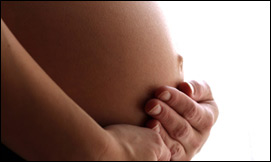Pregnancy skin care
Feature
Due to hormone fluctuation, not every pregnant woman is lucky enough to enjoy glowing skin, especially in the first trimester. The first ever appearance or a recurrence of acne is one of the pregnancy symptoms that you could definitely live without.
Pregnancy breakouts can be depressing, but the good news is that acne usually settles down during the second trimester, although some will have to endure the problem for much longer. At the other end of the scale, you may find that your skin seems extra parched and dry during pregnancy. Every woman, and pregnancy, is different.
Dry or oily, both demand attention and extra care. An extra diligent skin care regime is your most important means of control.
Start with a gentle cleanser, morning and night. For normal skin dermatologists recommend using a non-residue or glycerine-based facial cleanser. If your skin is ultra dry, then you should use a soapless rinse-off cleanser that’s mild and moisturising. If acne breakouts are particularly bad, use an antibacterial cleanser, but check the ingredients first.
It is often recommended that you avoid using alpha hydroxyl acids (AHAs) products, most often glycolic acid, and beta hydroxyl acids (BHA), most often salicylic acid. You also need to avoid vitamin A-based products. While these ingredients haven’t conclusively been linked with birth defects, they haven’t been extensively tested. As with many things in pregnancy, it is best to err on the side of caution.
Once cleansed, use a mild astringent toner, but, again, check the ingredients. Many of the cleansers and toners for acne-prone skin include AHAs and BHAs.
Bobbi Brown, president of Bobbi Brown Cosmetics, offers this additional advice for pregnant women, “Women should stay away from chemical peels or any topical antibiotic treatments not approved by their doctors.
“I also recommend that women stay away from steaming their skin as this may make it look and feel dehydrated.”
The most important addition you should make to your skin-care routine during pregnancy is a good quality moisturiser. The turnover of skin cells accelerates during pregnancy, so it demands regular moisturisation. Obviously, your choice will ultimately depend on the current needs of your skin: if it’s dry, go for richness; if it’s greasy, choose a lighter formula.
Whether your skin is dry or oily, always choose a moisturiser with at least SPF 15 and with broad spectrum protection that works against both UVA and UVB rays. During pregnancy, elevated hormone levels trigger the multiplication of pigment cells, which can cause chloasma, a brown patchy discolouration on the facial skin known as the mask of pregnancy, which usually fades shortly after birth. This can also be a problem when taking oral contraception.
Using a daily facial sunscreen, rain or shine, is the best way to avoid chloasma. For prolonged sun exposure at the beach, protect your face with a sunscreen of SPF 30 or higher. If you have breakouts, use a non-greasy non-pore-clogging sunscreen. Also don’t forget that your body’s skin is far more sensitive during pregnancy and is more likely to burn. Use a higher SPF factor than you would normally.
Picture caption: Due to hormone fluctuation, not every pregnant woman is lucky enough to enjoy glowing skin.

A guide to theraputic treatments
Ayurvedic Detox
Essential oil special
Beauty Tips
Herbs for Hair
The Power Of Aromatherapy Soap
Nails made easy
Hints & Tips
Celebrity Diet Secrets
Water, the Ultimate Detox Tool
Glowing skin
Nutrition
The beauty of raw food
Diet Truth
Dieting A-Z
Complementary Health
Beautcamp Pilates
Photo gallery: Ashtanga Yoga
Top mind and memory boosters
Feeling good and looking good
Help from the Dead Sea
Beauty and the berry
The beauty of pentapeptides
Features
Giving Up Smoking
Toxins: Where Do They Come From?
Bone-strengthening exercise
Pregnancy
Fishy facts for mums-to-be
Pregnancy skin care
Calm infertility stress with yoga at home





